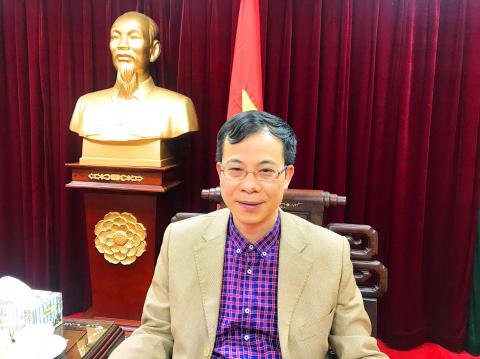The Vietnamese government hopes that Taiwan’s “new southbound policy” will increase Taiwanese investments in the nation as it boosts infrastructure development to support economic growth, Vietnam’s representative to Taiwan said.
The policy is mutually beneficial, Vietnam Economic and Cultural Office in Taipei Representative Tran Duy Hai said, and Vietnam is interested in establishing closer cooperation with Taiwan and attracting more investment from Taiwanese businesses.
Vietnam is especially seeking investment in infrastructure development and hopes to learn from Taiwan’s experience in building freeways, railways and metro systems as well as implementing high-tech farming, Tran said in an interview with the Central News Agency.

Photo: CNA
The policy is aimed at establishing closer economic ties with ASEAN members and India to reduce the nation’s economic dependence on China.
Tran said the policy has already encouraged more people from Southeast Asia to visit Taiwan by relaxing visa requirements for people in the region, adding that he expects visitor numbers to rise sharply.
The increased number of flights between Vietnam and Taiwan, at about 200 weekly, will boost mutual exchanges, Tran added.
Tran voiced a positive view of overall investment, trade and people-to-people relations between Taiwan and Vietnam.
Bilateral relations between the two nations have been improving since the 1990s and Taiwan is Vietnam’s fourth-largest source of foreign investment, with US$32 billion worth of investment, Tran said.
Taiwan is Vietnam’s fifth-largest trade partner, and bilateral trade last year reached US$12 billion and is continuing to rise, he added.
Taiwan is also home to the largest overseas Vietnamese population in the world, Tran said.
About 300,000 Vietnamese live in Taiwan, including 100,000 who are married to Taiwanese, 180,000 workers and 5,000 students; and about 30,000 Taiwanese live in Vietnam, including 6,000 businesspeople.

US President Donald Trump said "it’s up to" Chinese President Xi Jinping (習近平) what China does on Taiwan, but that he would be "very unhappy" with a change in the "status quo," the New York Times said in an interview published yesterday. Xi "considers it to be a part of China, and that’s up to him what he’s going to be doing," Trump told the newspaper on Wednesday. "But I’ve expressed to him that I would be very unhappy if he did that, and I don’t think he’ll do that," he added. "I hope he doesn’t do that." Trump made the comments in

NOT AN OPENING: Trump’s violation of international law does not affect China’s consideration in attacking Taiwan; Beijing lacks capability, not precedent, an official said Taiwanese officials see the US’ capture of the president of Venezuela as a powerful deterrent to Beijing’s aggression and a timely reminder of the US’ ability to defeat militaries equipped with Chinese-made weapons. The strikes that toppled Venezuelan President Nicolas Maduro signaled to authoritarian leaders, including Chinese President Xi Jinping (習近平), US President Donald Trump’s willingness to use military might for international affairs core to US interests, one senior official in Taipei’s security circle said. That reassured Taiwan, the person said. Taipei has also dismissed the idea that Trump’s apparent violation of international law could embolden Beijing, said the official, who was not

A cold surge advisory was today issued for 18 cities and counties across Taiwan, with temperatures of below 10°C forecast during the day and into tonight, the Central Weather Administration (CWA) said. New Taipei City, Taipei, Taoyuan and Hsinchu, Miaoli and Yilan counties are expected to experience sustained temperatures of 10°C or lower, the CWA said. Temperatures are likely to temporarily drop below 10°C in most other areas, except Taitung, Pingtung, Penghu and Lienchiang (Matsu) counties, CWA data showed. The cold weather is being caused by a strong continental cold air mass, combined with radiative cooling, a process in which heat escapes from

Snow this morning fell on Alishan for the first time in seven years, as a strong continental cold air mass sent temperatures plunging across Taiwan, the Central Weather Administration (CWA) said. The Alishan weather station, located at an elevation of about 2,200m in central Taiwan, recorded snowfall from 8:55am to 9:15am, when the temperature dropped to about 1°C, the CWA said. With increased moisture and low temperatures in the high-altitude Alishan area, the conditions were favorable for snow, CWA forecaster Tsai Yi-chi (蔡伊其) said. The last time snow fell at the Alishan weather station was on Jan. 10, 2018, while graupel fell there